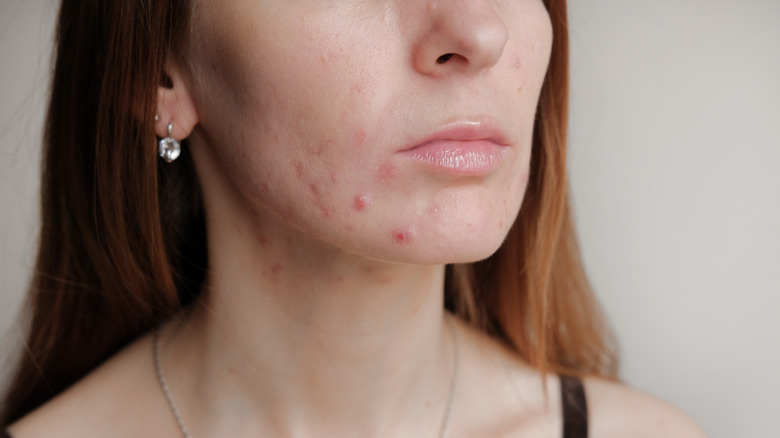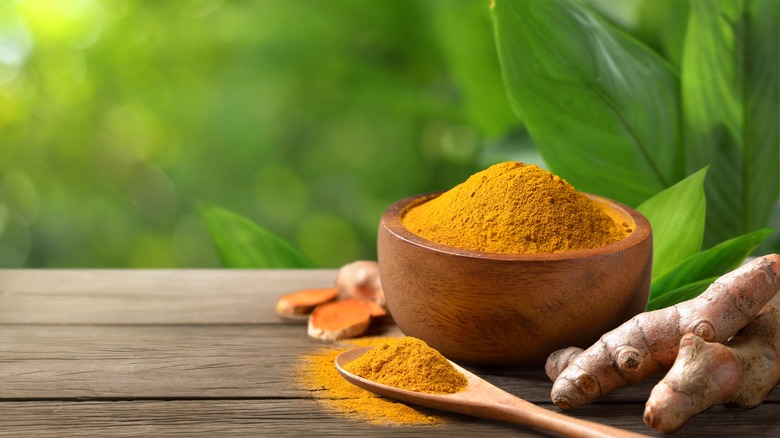Turmeric Could Be The Blemish Busting Acne Treatment You Need
If you're into cooking or health, you likely have heard about the benefits of turmeric, a popular addition to many Indian and Caribbean dishes. In recent years, its appeal has dramatically taken off, primarily due to its medicinal effects. Native to Southeast Asia, this yellow spice is now widely available in most grocery stores.
The active ingredient in turmeric responsible for its health benefits is a compound known as curcumin. "Like other colorful plant-based foods, turmeric is rich in phytonutrients that may protect the body by neutralizing free radicals (pollution, sunlight) and shielding the cells from damage," oncology clinical dietitian and nutritionist Mary-Eve Brown tells Johns Hopkins Medicine. "Anyone who's trying to manage inflammation could benefit from adding some turmeric to their foods."
Inflammation can cause a host of maladies in the body, from high blood pressure and heart disease to asthma and depression, as well as inflammatory skin conditions. It also contributes to inflammatory acne, and there is reason to believe turmeric may be the answer.
How turmeric can tame acne
Turmeric may not be the first thing you reach for when you experience a breakout, but it has promising effects. A study found that in addition to being an antioxidant, turmeric has both anti-inflammatory and antimicrobial properties that help improve many skin conditions. Research shows it improves alopecia, atopic dermatitis, psoriasis, and vitiligo. It was also found to help treat acne.
"Recent clinical studies on curcumin, the active ingredient in turmeric, indicate that it's an antioxidant and offers anti-inflammatory benefits," says board-certified dermatologist Dr. Marnie Nussbaum (via Well + Good). "Think inhibiting inflammation signals in the body." The spice is thought to help reduce the inflammation that is prevalent in inflammatory acne, which is characterized by large red and swollen pimples and pustules that can often be painful. It may also help smooth the skin and aid in healing acne scars and red spots.
Another fascinating way it may help acne is by killing off bacteria. "Some research suggests that curcumin, when combined with lauric acid, contains antibacterial properties that may help banish certain types of acne-causing bacteria — specifically, P. acnes," says Nussbaum.
How to use turmeric to treat acne
Turmeric can be ingested or it can be applied topically. There are many ways to consume the spice. Many people choose to regularly add turmeric to their recipes for its taste, which is slightly like ginger and also a little bitter, but also as a health boost. In fact, adding turmeric to a healthy fat with a sprinkle of some black pepper may increase the healing properties of curcumin. You can also add ground turmeric to a bevy of dishes, including rice, vegetables, hummus, smoothies, and even pancakes.
If turmeric isn't your favorite when added to food, it might still be your cup of tea. You can make turmeric tea at home to gain health benefits. Just sprinkle a ¼ teaspoon of turmeric into your regular morning or afternoon tea. Ground turmeric works best.
If you prefer to use turmeric topically, there are several creams and gels on the market that contain it. You can also use ground turmeric to mix with water to create a paste to apply to the skin. However, it's best to check with your dermatologist, since turmeric can be drying and can cause allergic reactions in some people.


